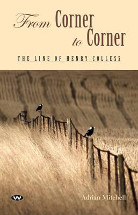From corner to corner : the line of Henry Colless by Adrian Mitchell

Wakefield Press, 2015. ISBN 9781743053690
(Age: Adults who are interested in local history) Recounting the
exploits of generations of the Colless family, the story of Colonial
Australia is told in a way which focuses on the efforts and
achievements of everyday men and women.
When George Colless was transported to New South Wales as a convict
in 1797, it could be argued that it was the best thing that ever
happened to him. Certainly completing his two year sentence would
have been arduous, however his prospects upon release were
infinitely better than what he would have faced as an impoverished
farm labourer in England. The new colony required food and George
was granted land along the Nepean River and convicts to help him
work it, instantly elevating his station in life.
The height and extent of the periodic floods along this river at the
time are mind boggling and bring to mind Dorothea Mackellar's poem My
country. Indeed George's children and grandchildren would
eventually spread over the sunburnt country as far as Bourke and
even Innamincka as pastoralists and drovers - alternately facing
disastrously destructive floods in the wet season and searing
droughts in summer. In 1888, a drought claimed more than five
million sheep in New South Wales alone.
The notion of being able to claim enormous tracts of land from the
Crown is difficult to fathom in modern times and it seems to follow
that such individuals must have enjoyed great wealth. As shown in
this work however, the price paid in terms of hardship, bankruptcy,
injury and even death often outweighed any benefit.
Some however were successful and George's son Henry showed great
courage, endurance and vision in his measured risk taking,
undertaking ventures including droving, pastoralism, the hotel
trade, horse racing and property acquisition. Henry is shown to have
been a larger than life character and his exploits are amazing, and
whilst not belittling them in any way, I could not help reflecting
that so much could be achieved more easily in a time where little
regulation existed.
Nevertheless, Henry was truly resourceful and tenacious, surviving
where others didn't and prospering well enough in good times to
survive the floods, droughts, economic depressions, shearers'
strikes and ridiculously common property fires.
Adrian Mitchell places members from generations of the Colless
family against the backdrop of our early history. He cleverly ties
the activities of the family to the geography and well known
characters appearing in the important events of our nation's story.
Rob Welsh